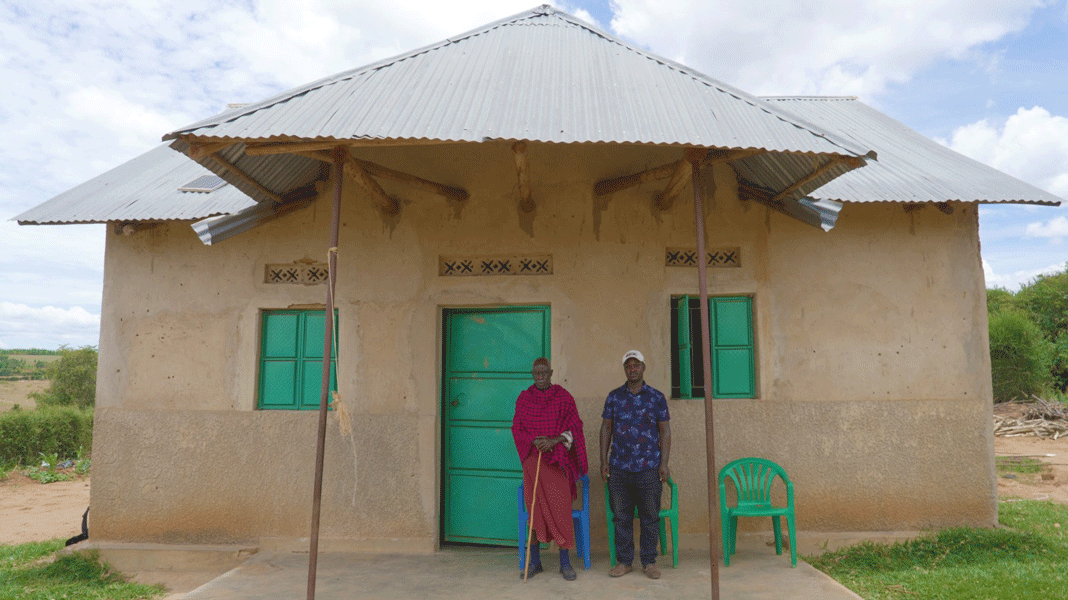By Zechariah Makuach Maror
When Rwandan national, Gashumba Alphonse, arrived in Uganda in 2004 as a 9-year-old refugee, he would not have imagined that twenty years later, he would be a self-sufficient farmer, with 20 employees and able to support his parents plus nine other family members.
Alphonse and his family live in Nakivale Refugee Settlement located in the Isingiro District of southwest Uganda, close to the Tanzanian border. It is the eighth-largest refugee camp in the world. There is limited access to health and educational services, and employment or business opportunities mostly lie in crop farming and cattle husbandry.
As a young man, despite not having a formal education, Alphonse was determined to quickly adapt to his circumstances and find a way to support his family. He picked up money-making tips from others and started his entrepreneurial activities carrying and selling water with a jerry-can. He spent a couple of years doing this before befriending someone who leased him a “Bod-Boda,” a type of motorbike used to transport both people and cargo. In 2017, Alphonse used the proceeds to start growing maize and cassava on land that he rented from Ugandan citizens.
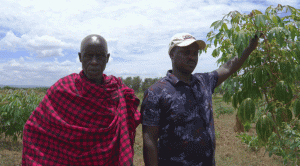
“My first action was to make a tour around to know all corners of Nakivale,” he says. “I found out some are growing crops. I realised that I can also try it to feed my family because the food assistance we were getting from UNHCR was so little, especially for a big family like mine. I met an old Rwandan refugee in Nakivale who was greatly successful in farming. He gave me advice and orientation on farming activities and has really increased my commitment and confidence to engage in farming activities.”
After a few months, he saw big improvements in his farming and decided to expand to growing bananas. With the profits he made through banana farming, he was able to start raising cattle, and eventually secured enough to start a dairy business.
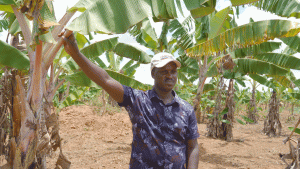
“First, I did cattle farming to get milk for my family, especially for [the] kids and eldest parents. I also sold some milk to meet [their other] needs such as education and health,” he says. Today, Alphonse provides his services to the entire refugee community and many within the local neighborhood. “The children within my community get milk from me. If I make a good harvest of my crops, my community will also get seeds and agriculture products from me,” he beams excitedly.
If I make a good harvest of my crops, my community will also get seeds and agriculture products from me
Alphonse’s father, Franck Bwanakweri, who was a farmer in Rwanda is grateful that his son is excelling in the same line of work. Despite not being able to work due to his vision problems and caring for his severely ill wife, seeing his son thrive gives him pride and peace. “I am proud of him, and this makes my mind stable. I feel protected and supported. I am happy to see him giving educational support to his sisters and feeding the whole family. For me as father, I consider my son as God’s blessing to the family. If he can get support, I believe that he can reach far in life,” he says.
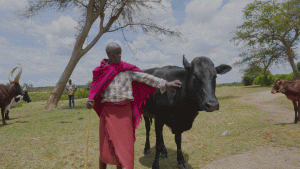
Being a productive and self-sufficient farmer is not easy because under local laws and national policies drafted in agreement with the UNHCR, refugees’ access to free land for farming is restricted. Only those who can raise enough money to rent or purchase land directly from locals can grow their farming businesses. The UNHCR also reserves a plot of land for potential future refugee arrivals.
This poses severe limitations for existing refugees, but Alphonse perseveres. He is solely dependent on his local market, which is fiercely competitive, but he believes that his personal relationship with his customers and the quality of his produce will bring him to the top.
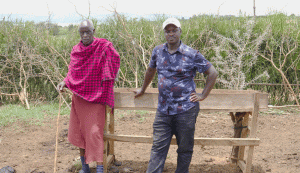
Another factor that has a significant impact on productivity in the region is climate change. “Sometimes, we have heavy rain, and the flood devastates our crops and causes soil erosion, eroding it to Nakivale Lake. And again, like now, there is too much sunshine, our crops are drying due to the lack of rain. Our seeds have remained inside the soil, they can’t grow. Climate change is at odds with us,” he says.
The changing climate also impacts his livestock. “I am facing a lack of grass for cows. There are also crop and cattle diseases. It’s not easy to afford pesticides and insecticides. Also, we don’t have clean water. My cows are consuming polluted water from Nakivale Lake. I don’t have [the] means to bring clean water to my home. My cows, if they were consuming clean water, they could look better. And also, you know cows need food apart from grass and I am facing problems getting some forage which can increase milk and make my cows fat and healthy.”
Despite there being a strong bond between the local population and the refugee community, tension still exists due to the increasing scarcity of resources like water, food, shelter and other social services. “Sometimes nationals are jealous of our progress. If for example, our cows move to a national’s land, they raise conflicts. As refugees, we try to live in harmony with Ugandan citizens because we have an interest to integrate and make a good cohesion within our environment, and our society,” says Alphonse.
As refugees, we try to live in harmony with Ugandan citizens because we have an interest to integrate and make a good cohesion within our environment, and our society
Regardless of the many challenges that the climate and laws present, Alphonse tries to be ambitious about his future. He believes there is a bigger market for his products and services. His many experiences have only made him stronger. For example, he now knows that the suppliers who are currently dealing in farm products and transport goods in nearby towns and cities ignore the abundance of good produce made at the refugee camp.
In situations when he was previously able to trade with these businessmen, they took advantage of Alphonse’s unfamiliarity with prices outside the region and his lack of fluency in their language. However, Alphonse is working hard to put an end to this. In a resilient attempt, he is planning to buy trucks to transport the produce to the nearby profitable towns and cities himself.
“I am confident that we can live well as refugees and if we get funding, we can make our farming project the valuable asset for Uganda.” he says. “The good thing here is that the citizens are kindly cooperating with refugees.”
Alphonse encourages others not to see refugees as burdens in their countries as they have some great talents which can help change the world. “Those who see us as burden, they are mistaken. We are still human beings whose actions can contribute to the development of communities, host countries, Africa and the world. We just need moral, intellectual and financial support to realize our dreams,” he says.
The writer is Journalist, Human Right Activist, and South Sudanese refugee living in Kampala, Uganda. He is an Editor in Chief of refugee led media, Journey Media; he could be reach via zeemakuach@hotmail.com.
Images: Abul Ajak
